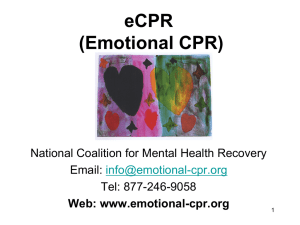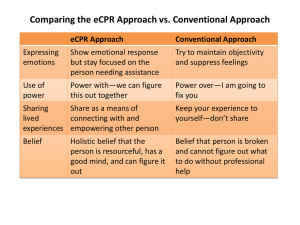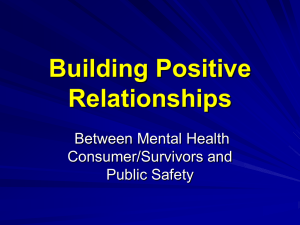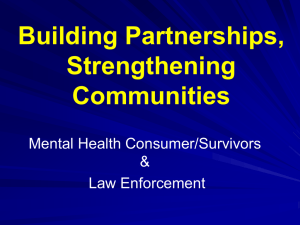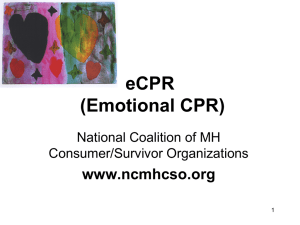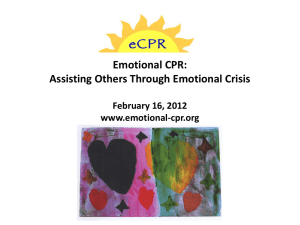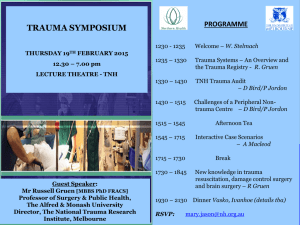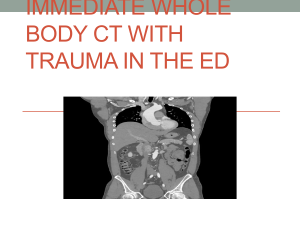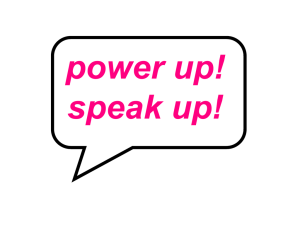PPT-for-eCPR-Webinar-4.9.13
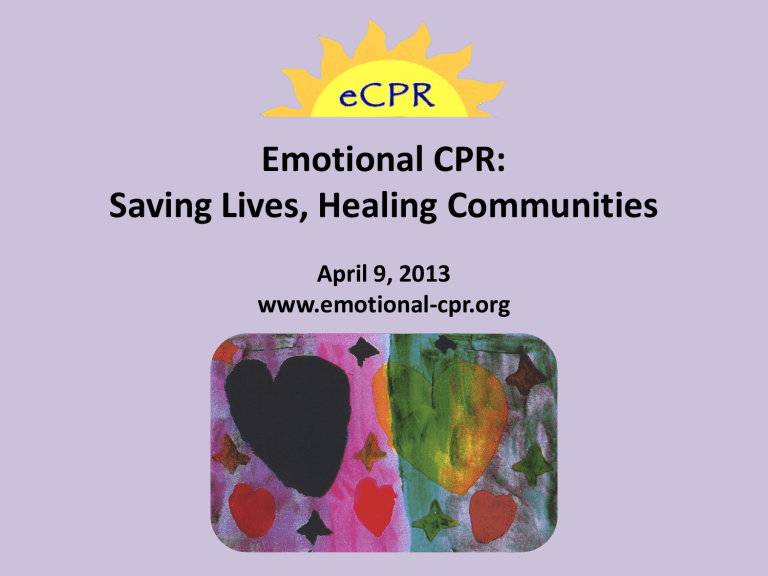
Emotional CPR:
Saving Lives, Healing Communities
April 9, 2013 www.emotional-cpr.org
Webinar Outline
1. Overview of eCPR
2. A Tool of Peacemaking and Bringing Healing to Communities
3. Cultural Considerations, Learning Together
4. Suicide Prevention
5. Public Safety and First Responders www.emotional-cpr.org
2
Archive
This Training Teleconference will be recorded. The PowerPoint presentation and the audio recording of the teleconference will be posted to the eCPR website at: http://www.emotionalcpr.org/resources.htm
www.emotional-cpr.org
Questions?
At the end of the webinar presentation, there will be a Q & A session. You are invited to ask questions at any time through the “question” function. During the Q & A session, you may ask a question via the “hand raise” function, if you wish to ask a question verbally. Questions will be taken in the order they are received. www.emotional-cpr.org
Speakers
Sandra “Sam” Ahrens Daniel B. Fisher Lauren Spiro
Oryx Cohen Tracy Love www.emotional-cpr.org
Ed Riddell
5
What is eCPR?
A public health education program which prepares members of the public to assist a person who is experiencing an emotional crisis.
The three components of the practice of eCPR:
C = Connecting with Compassion and Concern to Communicate
P = emPowering to experience Passion, Purpose and Planning
R = Revitalizing through Reestablishing Relationships, Routines and Rhythms in the community www.emotional-cpr.org
6
eCPR Is Based on the Values of a Healthy Community
a) Respectful, trusting relationships b) Recovery is possible for everyone: centrality of hope c) Self-determination (dignity of choice) is vital, especially for persons in crisis d) Connecting on a mutually respectful emotional level e) Validity of emotional expression f) Cultural attunement and inclusion across diverse groups g) Every individual is appreciated as a healthy person inside who has encountered trauma www.emotional-cpr.org
7
A Tool of Peacemaking and Bringing Healing to Communities
Kofi Annan, former Secretary General of the United Nations, says eCPR practitioners are peace makers.
Many people who have been trained in eCPR tell us that the skills they learned have helped them communicate better in all their relationships.
They also tell us that eCPR is a way of life. www.emotional-cpr.org
A Tool of Peacemaking and Bringing Healing to Communities
• Inner peace creates global peace.
• Human disconnection, a separation of self from self and self from others, is a fundamental concept in both traumainformed practice and in eCPR.
• The impact of trauma and human disconnection in my own early childhood resulted in my clinging to anyone who offered safety and anything that could numb the pain.
• The Connecting bond, seeing the person in their full humanity, is often what transforms crisis into new learning and pathways to healing. www.emotional-cpr.org
A Tool to Curb Intergenerational
Trauma and Community
Violence
Intergenerational trauma: a culmination of emotional and psychological wounding over a lifespan and across generations
(websters dictionary on line) Leah – please cite as appropriate.
(I will) www.emotional-cpr.org
A Tool to Curb Intergenerational
Trauma and Community
Violence
A way to approach people of all ages. For example, a provider from Omaha, Nebraska, said “eCPR was the most gentle, nonaggressive, non-authoritative approach to reach the youth; it allows us to work together to create a safe and supportive environment which in turns helps the (young) people we serve feel empowered.” www.emotional-cpr.org
A Tool to Curb Intergenerational
Trauma and Community
Violence
Many people in the African-American community go to churches, congregations or faith-based organizations to find healing from trauma and violence.
The church leadership wants a way to:
• Connect and support people to help them see and be comfortable with their own strengths.
• Equip the Congregation with skills and tools so they can support anyone that they notice in distress or those that may approach them.
www.emotional-cpr.org
A Culture-Spanning Approach: eCPR in Singapore
• Reinforces eCPR as a process of mutual learning
• Relationship first - it starts with connecting
• Non-verbal communication - universal, body-based dialogue
• Really being present - learning to listen in new ways
• Development of trust through sharing and open dialogue
• Another culture helps us to see our own
• Being with people beyond formal training is vital
• Role plays create an immediate shared reality
• Cultural interchange is a unique path for personal growth and for the development of eCPR as a whole www.emotional-cpr.org
13
www.emotional-cpr.org
14
A Public Safety and First
Responder Approach
Goals:
• Improve communication, collaboration, and cooperation between public safety/law enforcement, the community, and people who experience emotional crisis
• Enhance the safety net
• Trauma - sensitive communities
• Improve understanding between people in emotional crisis and public safety responders www.emotional-cpr.org
15
Building Positive
Relationships
82 nd Ave. Man (Story)
Public Safety Requires Understanding and Communication to:
• Reduce and prevent incidents of traumatic/negative interactions between people in emotional crisis and law enforcement
• Build trusting, mutually respectful relationships www.emotional-cpr.org
16
The Concerns?
Public Safety Member
1)Keeping everyone safe (including self)
2)Resolving the event
3)Following all policies / procedures
/ laws
4)Assessing - what is the appropriate response?
5)Decisional Framework: What is best for the community? Use of force?
6)Few therapeutic tools
7)Time sensitive (possibly)
8)Others?
Person in crisis
1)Getting immediate needs met (e.g. safety, food, etc)
2)Resolving the pain / discomfort
3)Feeling scarred and powerless
4)Disconnected - thinking shuts down; emotions are in protective / survival mode
5)Not focused on community needs due to immediate crisis needs; need to feel validated
6)Need support to access personal strengths to make good decisions
7)Take time to connect to ensure safety
8)Becoming a victim or a criminal www.emotional-cpr.org
17
Comparing the eCPR Approach with the Conventional
Safety Approach
Accessible eCPR Approach Public Safety Approach
Lay language, culturally attuned Professional terms, cultural-centric
Uses of power
Belief
Power with; we can figure this out together
The person is a whole human being and with assistance can figure it out
Avoided
Power over; I am going to fix the person or problem
Belief that person is broken and cannot figure out what to do without professional help
Recommended Use of labeling and categories
Coercion
Fear
Minimizing trauma, typically seen as not necessary
Fear is diminished by being in relationship
Exercised, seen as necessary
Fear is managed by LE via exercising presence of being in charge
“The Take Away”
Public Safety Responders have a lot stacked against them when they are responding to a person in crisis or to those organizations critical of their response procedures.
eCPR can provide tools to be proactive in developing positive relationships with people in emotional crisis wherever and whenever they occur.
I strongly encourage public safety members to look at eCPR as a tool to develop relationships with people in emotional crisis.
www.emotional-cpr.org
19
Q & A Session
The speakers will now address your questions and comments.
You may ask questions either via the “question” function or via the “hand raise” function, if you wish to ask a question verbally.
If we do not get to all questions during this discussion session, questions will be archived, and we will respond to you individually.
www.emotional-cpr.org
Endorsements
CARF International, the largest behavioral healthcare accrediting organization in the world, recommends eCPR as “a holistic, empowering approach to assisting persons served to cope with emotional crisis.” eCPR is also recommended by the International Association of
Chief’s of Police (IACP) who state that “law enforcement personnel who learn eCPR will be better equipped to efficiently and effectively resolve a crisis call involving people in emotional distress, thereby reducing potential escalation, harm, or injury. eCPR is recommended by the IACP as a way to enrich CIT curricula.” http://www.theiacp.org/PublicationsGuides/NationalPolicySummits/BuildingSaferCommunities/t abid/664/Default.aspx
www.emotional-cpr.org
Reviews of eCPR
What eCPR practitioners say:
• “When I am able to feel and accept my emotions, and not be frightened by them, I can create a relationship which allows the person in distress to accept their emotions and move through them.”
• “I was able to assist a person to come out of a remote state of consciousness and able to feel her anger and talk about it by my willingness to be flexible, creative in my approach, respond to her signals that I was headed in the wrong direction and continue listening to her and going with my intuition.”
What people say about the eCPR certification training:
• “In my 26 years of recovery I have not experienced anything as profound and empowering as the eCPR training. Thank you for helping me learn new tools and allowing myself to grow and express who I am. The whole training inspired me to be a better person.”
• “It was one of the most profound experiences I have ever had. This is the kind of work I want to be doing to build community. It is a transformative process.” www.emotional-cpr.org
Speakers
Sandra (Sam) Ahrens
Sam works for Grassroots Empowerment Project providing peer specialist training and technical assistance to peer-run mental health recovery centers across Wisconsin. Her education and career experience include teaching, social work, and advocacy in the areas of mental health, poverty and homelessness. In addition to her own lived experience of mental illness and recovery, Sam’s work with people in shelters, mental health and correctional institutions, as well as community-based organizations, have led her to have a passionate interest and commitment to eCPR and other practices that promote people being “in full possession of their humanity.” www.emotional-cpr.org
Speakers
Daniel B. Fisher, MD, PhD
Dan's life’s purpose comes from his lived experience of recovery from schizophrenia, which inspired him to dedicate himself to helping others find their voice and recover. He earned an MD, completed his residency in psychiatry at Harvard Medical
School, and has practiced as a board-certified, community psychiatrist for 30 years. In 1992, he co-founded the federally funded National Empowerment Center and serves as its executive director. He was a commissioner on the President’s
New Freedom Commission on Mental Health, 2002-03.
www.emotional-cpr.org
Speakers
Oryx Cohen
Oryx is the Technical Assistance Center director at the National
Empowerment Center. Prior to working at NEC, he was codirector of the Western Massachusetts Recovery Learning
Community (WM RLC) for four years. At the WM RLC he helped develop a system funded peer-run alternative to the mainstream system, and this has experienced amazing success
(www.westernmassrlc.org). He also co-founded the Freedom
Center in 2001, the Pioneer Valley’s only independent peer-run support/activist organization. He is currently adjunct faculty in the Westfield State College Psychology Department. www.emotional-cpr.org
Speakers
Tracy Love
Tracy is an eCPR Trainer and Wellness Educator who has transformed her lived experience in mental health and the criminal justice systems into advocacy for social justice and systems change nationally and throughout California. Currently
Tracy works with Bay Area Leaders in Cultural Attunement for healing of intergenerational trauma within the African-
American Community. www.emotional-cpr.org
Speakers
Ed Riddell
Ed served as a sworn member of the Portland Oregon Police
Bureau from 1992 to 2006. From 2000 to 2002 he worked as the
CIT Coordinator and helped to facilitate the training of many public safety responders. In Vermont Ed has worked in residential/outpatient substance abuse treatment, facilitating a grant to reduce seclusion and restraint in inpatient mental health programs, and he currently serves the State of Vermont as Public Safety Specialist to the Department of Disabilities,
Aging and Independent Living. Ed monitors and supports the treatment programs for intellectually disabled offenders served in the community under Vermont’s civil commitment statutes. www.emotional-cpr.org
Speakers
Lauren Spiro, MA
Lauren’s journey of liberation, including being labeled with chronic schizophrenia as a teenager, fuels her passion and informs her life’s work. Her vision is to build an inclusive
America and she currently serves as the director of the National
Coalition for Mental Health Recovery. She co-founded two mental health nonprofit organizations and has worked for decades in clinical mental health settings as well as an advocate promoting holistic alternative services and supports. She is an artist who is awakening to the power of creative expression as a tool to transform consciousness. She has an MA in clinical/community psychology and will publish her memoir this year.
www.emotional-cpr.org
Archive
This Training Teleconference was recorded. The PowerPoint presentation and the audio recording of the teleconference will be posted to the eCPR website at: http://www.emotionalcpr.org/resources.htm
www.emotional-cpr.org
Contact us:
Email: info@emotional-cpr.org
Tel: 877-246-9058
Web: www.emotional-cpr.org
www.emotional-cpr.org
30
